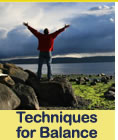    

Techniques for negotiating:

Personal Rebellion Maria and I saw a ghastly play a couple of weeks ago. It tried too hard to be unique, which resulted in its being boring. Several audience members were dozing, a lot more paying just polite attention. At intermission, I looked at my wife and said, "Would you be adverse to leaving?" "I thought you'd never ask," she said, grabbing her coat. Seldom, ever, do I leave a play at intermission because I love the theater. But this would have been a continued waste of time, unpleasant memory, and royal pain. We waited until intermission so as not to inconvenience those around us (we were second row, center) nor distract the actors. But when the time was right, the time was right. I watch people in the theater (and opera, and ballet, and even athletic events) fall asleep, amuse themselves on PDAs, chat with others - in other words, do whatever they can short of depart. We try too much to conform to group norms and stay within our herds. I believe that group norms make sense in terms of not jumping a ticket line and causing others grief (and ourselves bodily harm, perhaps) but they stop short of personal actions which enhance our lives with no detriment to others. I don't feel guilty or remorseful in any way when I depart from a boring cocktail reception as soon as possible, or return a poorly cooked meal in a restaurant, or decline an invitation to spend time with people I just don't like. Someone sent me an "anecdote" by email today. I replied, asking who they were and why they were sending it to me. The reply was that the person is a subscriber to Balancing Act and wanted me to have it. Imagine if 7,000 readers of the newsletter, or 100,000 people who have heard me speak, or 1,000,000 who have read my books all started to send me anecdotes, or clippings, or photos, or whatever? I'd have to move to Bulgaria. (Sofia is lovely in springtime, I'm told.) The writer accused me of being "out of balance" for objecting to the unsolicited email (which is done periodically by this person)! I'm not "out of balance" for trying to maintain my own comfort and sanity. I think you're out of balance when you feel you have the right to unilaterally impose on someone else. But that's why it's so valuable to be willing to step outside of conventional norms. If you can't protect your privacy and direction, then you're a jellyfish subject to the winds and tides of life for propulsion. And if that's the case, it's awfully hard to leave the theater at intermission. 
I'm not sure what the phrase "the war on terror" actually means. I have a lot of trouble with "Two Americas." It seems to me that metaphors, which are supposed to aid in communication, often serve to replace communications with bromides. These perorations are confusing at best and deceptive at worst. On Alan's Forums, a private web site for people in my community or people who pay a fee to join, there are continual discussions about terrorists and their impact on our world. Some people have claimed that they represent the worst threat to our existence in the history of our nation (or any nation). I lived through the entire "cold war." (Another metaphor: The Iron Curtain, or Evil Empire.) During my grammar school education we would practice drilling for air raids on a monthly basis, dutifully heading for the school basement (in line, no talking), to sit on the cold floor and cover our heads with that remarkable cotton jacket that was going to prevent us from suffering the effects of radiation. We were thrilled to do this, because it took at least a half-hour or more from class time, and the teachers seemed to hate it, all good reasons to be for it. And with our coats over our heads, the teachers couldn't tell who was talking! ("I am Spartacus!" "NO, I am Spartacus!!") The truth of course, is that the United States and the Soviet Union could have ended life as we know it had madmen been at the helm or crazies taken over the silos. Everyone knew that was possible, perhaps never more so than during the Cuban Missile Crisis. Yet, we got up each day, went about our business, played some stickball, and made plans for what we would do when we grew up. I can't remember hearing my parents talk about nuclear holocaust at the dinner table. They were much more likely to be talking about the rent money or the weather. We need some perspective. Those of use who travel are reminded at every airport of the intense sensitivity to the potential for murder and mayhem. But it generally doesn't happen. I've known people who have stopped traveling for pleasure, and that is simply sad. There was another senseless campus killing spree in February in Illinois. It's a tragedy and a horror. But there are about 16 million students enrolled in colleges in the U.S. alone. Should this event prompt parents to withdraw their sons and daughters, or never send them at all? We must stop being scared, which means we must create perspective for ourselves. In reality, the most dangerous, frequent event most of us undertake is to drive on the highways, at speed, with people all around us who may be distracted, impaired, or incompetent. Yet, we usually make it, even when we, ourselves, do some stupid things. I don't mean to insult value systems or be a malapert. But I do wish to create some perspective. As one of the students sitting in that damp basement with my colleagues, I was more afraid of the dark under my jacket then I was of enemy bombers. But I learned to lift a corner and let in the light. 
I sat at a dinner, hosted by a friend of a friend I had never met, in a private club, and I was engaged in a disquisition for the group on what "jury nullification" means. I found out later that our host was a prominent trial lawyer! (I didn't feel all that bad, because our big-talking host was pecuniary enough to arrange for separate checks in a private club, though I wondered if that were due to my oration.) |

Balancing Act® is our registered trademark. You are encouraged to share the contents with others with appropriate attribution. Please use the ® whenever the phrase "Balancing Act" is used in connection with this newsletter or our workshops. Our subscriber count is now 7,665. Last Call for The Coach
A 1.5 day workshop on coaching in March outside of Providence, featuring real people being coached, techniques, brands, marketing, fees, and a special charity dinner with the lovely Maria for Smile Train, as well as one with me for the animals. (The Strategist sold out. First come, first served.) Million Dollar Consulting College
I'm running another in the first quarter, the week of March 31 in Newport, RI. November was a huge success, and you can see photos on my site. The last time I said that, I had 18 people register! Last one before the Graduate School in April. Only four seats remain in a great facility, surrounded by water views. Renaissance Journey
My favorite program to run, maximum of 10 people. It is scheduled for June 14-15 in Newport. A long weekend of exploration of happiness, relationships, growth, and laughter. Exceptional facility and meals. Write me if you'd like to discuss or register: The Odd Couple®
Marketing techniques for professional and aspiring speakers, San Francisco, March 8-9. Great location, great fun, great learning. "If you can't distinguish and appreciate shades of gray, then life is too black and white, too simplistic, and too boring." -- AW 
|
|
Balancing Act® is a monthly electronic newsletter discussing the
blending of life, work, and relationships, based on the popular
Balancing Act workshops and writing of Alan Weiss, Ph.D. Contact us
for further information at: [email protected].
|
|

